|
International Perspectives - September 20, 1999
Anne D. Picker
International Economist, Econoday
Hurricanes and typhoons...
The markets reeled under an avalanche of indicators and mother nature's storms.
Indicators galore...
United Kingdom
Unemployment fell to 4.2 percent, the lowest level since March 1980. This is the sixth month in a row that the jobless total dropped and analysts expect that the downward trend will continue. A broader measure of unemployment (preferred by the government) is the International Labor Organization unemployment rate. It includes people who are not eligible for unemployment benefits but are looking for jobs. This rate also fell to a new low - 5.9 percent for the three months to July, compared to 6.2 percent in the previous three months. The total number employed also reached a new high.
Average earnings rose at an annual rate of 4.6 percent in July, compared to 4.4 percent in June. June average earnings were boosted by bonus payments. Wages and salaries in the booming service sector are rising at about five percent a year, but only 3.4 percent in manufacturing. The Bank of England's Monetary Policy Committee closely watches these statistics and any sharp jump in earnings could trigger higher interest rates.
The August Retail Price Index fell to its lowest level since 1963 - 1.1 percent when compared with August 1998. RPIX, which excludes mortgage interest payments, rose 0.2 percent in August. That brought the annual rate down to 2.1 percent from 2.2 percent in July. This was below all forecasts and the fifth consecutive month in which RPIX (the Bank of England's inflation monitor) has been below the inflation target of 2.5 percent.
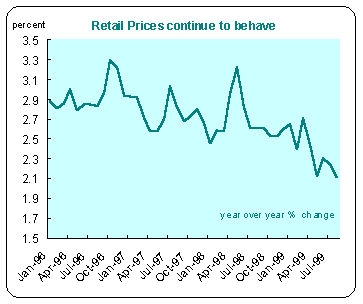
The lower than target rate of inflation is raising questions as to why the Bank of England decided to raise interest rates by 25 basis points to 5.25 percent at their last meeting. While the short-term outlook for inflation remains benign, the Bank of England's Monetary Policy Committee is much more concerned with the inflation profile two years ahead. Although inflation is expected to remain below the target of 2.5 percent in the short term, the MPC concluded that an interest rate increase was necessary to keep inflation on track further ahead.
Retail sales exceeded expectations in August offering further confirmation that the underlying growth rate has picked up in recent months. Retail sales were up 0.8 percent on the month and 3.6 percent on the year. Data for June and July were also revised up. Analysts said the latest data strengthened the case for another interest rate increase by the Bank of England before the year is out.
Germany
July real retail sales fell when compared to the same month last year, despite one more shopping Saturday during the summer sales season this year. The result was at the low end of expectations, providing evidence that German private consumption got off to a weak start in the third quarter. German consumer confidence weakened as the summer progressed; due in part to concerns about the economy along with uncertainty over the government deficit reduction and tax reform plans. If anything, uncertainty over the government's plans has increased in September given highly publicized election losses by the Social Democratic Party. German consumer confidence and therefore, private consumption, is a big question mark for the economy. Total real seasonally adjusted retail sales fell 1.3 percent on the month and 1.1 percent on the year. Nominal seasonally adjusted retail sales fell 0.4 percent on the month and 0.9 percent on the year.
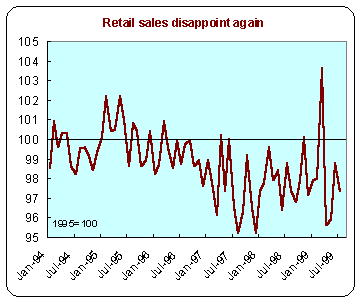
Producer input prices rose by much less than expected in August as higher crude oil prices were partially offset by falls in the price of electricity and agriculture products. Seasonally adjusted input prices rose by 0.1 percent on the month which pushed the annual rate up to 3.7 percent from 2.8 percent last month. Crude oil prices continued to exert the biggest upward effect on the index. Output prices rose primarily because of higher petroleum product prices.
France
France's June current account surplus stood at the top of analysts' forecasts with an increase of 826 million euros to 2.826 billion euros. The merchandise trade surplus provided most of the jump, as exports outpaced imports. The revenues balance swung to plus of 107 million euros from a deficit of 190 million euros thanks to rising portfolio investment income.
Italy
Industrial output in July rose an adjusted 0.5 percent on the month, below the lowest market forecast. When compared with last year the adjusted rate is up 0.4 percent and positive for the first time since September 1998.
European Monetary Union
Gross Domestic Product among the EMU-11 states was at the low end of expectations in the second quarter, rising 0.3 percent on the quarter and 1.5 percent from the year-earlier level. First quarter GDP was revised down to show gains of 0.4 percent on the quarter and 1.6 percent on the year. The data suggest there will have to be a strong pickup in the second half this year to achieve the ECB's forecast growth of two percent.
First quarter seasonally adjusted total hourly labor costs in the 11 euroland countries - excluding agriculture, education and health - rose an unrevised 1.8 percent compared to the same quarter last year.
Switzerland
Seasonally and calendar adjusted second quarter Gross Domestic Product rose 1.2 percent compared to the previous quarter. Compared to a year earlier, GDP rose 1.1 percent in the second quarter. Growth was spearheaded by net exports - with exports rising sharply and imports declining - and stronger construction investment.
Asia
Australia
The September consumer sentiment index released by the Westpac Melbourne Institute reported a 4.1 percent rise in sentiment. This follows a decline of 4.0 percent in August. The positive reading points to continued consumer spending this year. With the economy performing favorably along with improving employment growth, consumer sentiment should be supportive going forward.
Singapore
Total employment rose in the second quarter for the first time in five quarters, helped by the services and manufacturing industries. The seasonally adjusted unemployment rate fell to 3.3 percent at the end of June from 3.9 percent in March and 4.4 percent in December 1998. Rising output in the manufacturing industry is driving the economic recovery, which in turn is creating more jobs. The economy expanded 6.7 percent in the second quarter.
Japan
The current account surplus for July slipped 2.7 percent from a year earlier. Goods and services trade for the month was down 5.5 percent from a year earlier.
Americas
Canada
The August consumer price index jumped 2.1 percent when compared with August 1998 and 0.3 percent on the month. The increase follows annual increases of 1.6 percent in June and 1.8 percent in July. The accelerated growth in the index reflects rapidly rising gasoline prices and higher rates for natural gas. Excluding energy, the growth in the index has remained unchanged at about 1.5. Downward pressures on the CPI were exerted by lower prices for computer equipment and supplies, and telephone services.
Mexico
Industrial production was up 4.4 percent in July from the year earlier. Production in the manufacturing sector rose five percent in July compared with the year earlier period, spurred by strong growth in maquiladoras, or in-bond factories. In-bond factories depend on the importation of components into a free-trade zone for processing and export without payment of duties. Construction activity expanded 3.7 percent in July over the year-earlier month, while the generation of electricity, the production of gas and water increased by 2.8 percent in the same month over the year-earlier period. However, production decreased in the mining sector, principally because of a reduction in crude petroleum extraction.
Argentina
Gross domestic product contracted 4.9 percent in the second quarter compared with a year earlier. GDP contracted 3 percent in the first quarter and expanded 3.9 percent in 1998.
Indicators abroad paint a picture of slowly recovering economies. Britain's economy is more robust than the rest of Europe. Inflation remains dormant with the exception of petroleum prices. On the whole, these reports were favorable for the markets and investors alike.
Financial Markets
World Equity Exchanges
Most equity markets ended the week on a decidedly negative note despite gains on Friday. Mother Nature and market events conspired to drive key world markets down on the week. Japan enjoyed a bank holiday on Wednesday, but Hong Kong was forced to close its markets Thursday because of a monster typhoon. And hurricane Floyd raked the U.S. east coast, distracting market participants and forcing the bond market to close early Thursday. There were plenty of economic indicators for the market to digest; but traders proved insatiable when it came to news about the U.S. economy. They were looking for the next data set even before the last was absorbed.
| Selected World Stock Market Indexes |
| Index | 10-Sep | 1999
High | 1999
Low | Week %
Change |
|---|
| Asia |
| Australia | All Ordinaries | 2914.70 | 3145.20 | 2804.80 | -2.94 |
| Japan | Nikkei 225 | 17342.27 | 18357.90 | 13232.70 | -2.08 |
| Hong Kong | Hang Seng | 13484.84 | 14506.74 | 9076.33 | -2.68 |
| S. Korea | Korea Composite | 925.20 | 1027.93 | 498.42 | -3.82 |
| Europe |
| Britain | FTSE 100 | 6039.80 | 6420.60 | 5770.20 | -2.44 |
| France | CAC |
4644.32 | 4745.48 | 3958.70 | -2.13 |
| Germany | XETRA DAX | 5303.94 | 5652.00 | 4668.50 | -3.28 |
| North America |
| United States | Dow | 10803.63 | 11209.80 | 9120.70 | -2.04 |
| Canada | TSE Composite 300 | 7062.48 | 7292.70 | 6180.30 | -1.41 |
| Mexico | Bolsa |
4951.68 | 7292.70 | 6180.30 | -0.57 |
A successful triple witching expiry of future and index options plus a much better feel to Wall Street helped some of Europe's equity markets to close on the up side for the first time in five trading sessions on Friday. The markets are expected to be nervous at least until after the next round interest rate deliberations conclude during the first week in October. The Federal Reserve Open Market Committee meets on October 5th, the Bank of England's Monetary Policy Committee meets on October 6th and 7th (with the decision announced at midday on the second day), and the European Central Bank meets on October 7th to set European Monetary Union rates.
Beginning today, September 20th, trading on the London stock market will open an hour earlier, 8am local time. This is the same time as other European stock markets open.
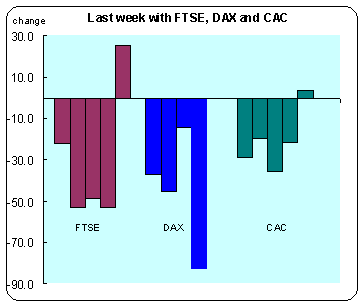
Asian equity markets also closed lower this week. The markets reacted negatively to the currency gyrations between the dollar and the yen. The Nikkei rose in Friday's trading because the yen was lower against the dollar. Fewer yen to the dollar means that the yen is appreciating in value. The graph below shows the interrelationship between the yen and the Nikkei. Generally the Nikkei rises when the yen loses value (more yen per dollar). A lower yen helps exporters increase sales abroad.
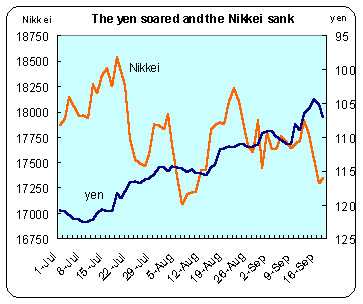
Currencies
Euro
The euro traded within a tight range last week. It was buffeted by the crosscurrents of yen-dollar trading. The European Central Bank has good reasons for hoping the euro will remain close to its current level. The euro is on something of a tightrope because a significant strengthening would endanger the predominantly export led recoveries in Germany and Italy. A drop below parity with the dollar would threaten confidence and open up the possibility of a greater slide, which would bring unwelcome inflationary consequences. There is also recognition that underlying economic developments in the euro-zone and in the U.S. will drive the euro-dollar rate, and neither intervention nor verbal support are likely to have substantial long term effects.
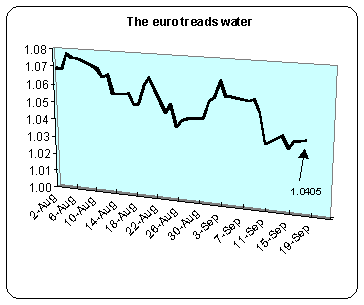
In its monthly report, the ECB concluded that attempting to jawbone the currency as they tried to do in July when the euro was at its nadir, is a delicate business. Saying nothing gives speculators nothing to fear, but saying too much can smack of panic and tends to move the currency in the opposite direction from that which was intended. More encouraging data from the weak eurozone economies will likely boost the euro more firmly into the ECB's comfort zone.
Yen
The yen fell sharply against the dollar Friday after Japanese officials said they were trying to enlist help from other nations in stemming the yen's strength. Japan appears to be redoubling its effort to secure the support of the U.S. Treasury and possibly the European Central Bank for joint intervention to weaken the yen. The subject is likely to be on the G-7 meeting agenda on September 25th.
The Bank of Japan has sold an estimated $35 billion worth of yen since June 10, fearful that the currency's strength might smother the country's fledgling recovery from a prolonged recession. A rising yen can hurt Japan's economy because it drives up the price of exports overseas, making them less competitive and reducing the value of foreign profits in terms of the yen.
Foreigners have bought a net $26 billion of Japanese stocks since June 10, when the government said the economy unexpectedly grew in the first three months of 1999. On Wednesday, the yen surged to its highest level against the dollar since January 1996 and climbed about 1.5 percent against the euro on expectations investors will plow more money into Japanese stocks. The yen has been strengthened by increased capital flows as investors return to the stock market in the belief that the economy has turned a corner. This trend is exacerbated by a belief that the U.S. dollar will be weighed down by the U.S. trade deficit.
Why U.S. investors care...
There are many crosscurrents at work in the markets. The stirrings of growth abroad after the years of decline and stagnation have sparked massive capital flows, especially to Japan. As the United States growth cycle reaches for the longevity record, the markets are wondering just how much longer the good times can last.
Looking Ahead
The following indicators will be released this week.
| Europe | | |
| Sept 20 | Italy | Final Consumer Price Index (August) |
| | Harmonized CPI (August) |
| Sept 21 | UK | Second planned auction of gold reserves |
| France | Trade Balance (July) |
| Germany | IFO Business Sentiment Index (August) |
| EMU | Harmonized CPI (August) |
| Sept 22 | UK | Bank of England releases minutes |
| | From Sept 7th and 8th meeting |
| | Gross Domestic Product (2Q99) |
| | Current Account Deficit (2Q99) |
| Italy | Labor Force Survey (July) |
| | Construction Orders (July) |
| Sept 23 | EMU | European Central Bank Policy Committee meeting |
| UK | Trade Deficit (July, August) |
| | CBI Industrial Trends Survey (September) |
| Germany | Producer Price Index (August) |
| Sept 24 | Italy | Retail Sales (July) |
| Asia | | |
| Sept 21 | Japan | Bank of Japan Monetary Policy Meeting |
North America | | |
| Sept 21 | Canada | Merchandise Trade (July) |
| Sept 22 | Canada | Retail Trade (July) |
| Mexico | Preliminary Trade Balance (August) |
| Sept 23 | Canada | International Securities Transactions (July) |
| Mexico | Retail Sales (July) |
| Sept 23-30 | | The International Monetary Fund and World Bank hold annual meeting in Washington, DC. |
| | G-7 scheduled to meet during the week. |
Release dates are subject to change.
For U.S. data releases, see this week's Simply Economics.
|






